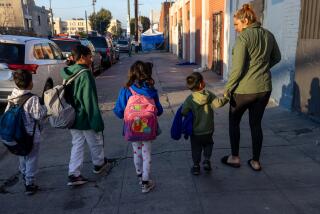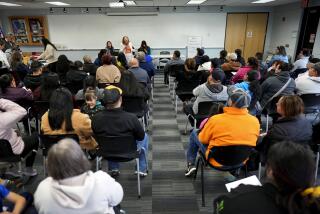Panel Supports Law to Protect Central Americans in U.S.
A committee appointed by Mayor Tom Bradley called Wednesday for the passage of federal legislation that would protect Central Americans in the United States from deportation and urged expansion of education, health and legal services for hundreds of thousands of refugees living in Los Angeles.
Agreeing with the committee’s conclusions during a news conference at City Hall, Bradley said that “more investigation is needed into the situation of those who have become displaced from their countries and become refugees in our country.”
Bradley said he supported enactment of the Moakley-DeConcini Central American Refugee bill, which would enable Salvadoran and Guatemalan immigrants to remain in the United States until peace returns to their war-torn countries. “Many feel they cannot return to their homelands and lead safe and secure lives,” Bradley said.
The bill, opposed by the Reagan Administration, has already been approved by the House of Representatives and is expected to go to the full Senate soon.
Passage of Legislation
Members of the committee agreed that their “immediate focus” was passage of legislation sponsored by Rep. John Joseph Moakley (D-Mass.) and Sen. Dennis DeConcini (D-Ariz.). Lauren McMahon, director of El Rescate, an East Los Angeles-based refugee aid group, said that “life for most Salvadorans and Guatemalans has been made more difficult” by new federal sanctions against the hiring of illegal aliens.
“Without the blanket protection offered by Moakley-DeConcini, asylum is the only other answer,” said McMahon, a member of the mayor’s committee. She added that the federal government, which believes that only Nicaraguan refugees have a strong case for political asylum, approved only 29 requests for asylum by Salvadorans last year. In contrast, 2,000 Nicaraguans won asylum in the United States.
McMahon and other committee members concluded that the city’s community of an estimated 500,000 Central American refugees, many of whom are impoverished or work at low-paying jobs, is in dire need of critical services.
“Almost all the private foundation money that was once available to refugees has now been transferred to programs supporting legalization,” under the yearlong federal amnesty, McMahon said.
As a result, the committee concluded in its 38-page report, more funds will be needed to expand “legal services, health and medical services, education, psychiatric care and counseling and child care” for refugees who remain in Los Angeles. The group, however, did not address the question of who would pay for the expanded services.
One agency, the Community Counseling Service, noted that its percentage of Latino clients has increased over the last three years from 20% to 80%. Salvadorans and Guatemalans make up half of that large Latino clientele, reported executive director Cecil Hoffman.
Committee members said that Central American refugees live under the daily strain of being illegal and are often racked by the trauma of strife in their homelands. Added to those pressures, the report concluded, are widespread job worries and fears of arrest under the new employer sanctions by many refugees who are ineligible for amnesty.
Not all of the committee’s conclusions were dismal. The report suggested that the refugees “contribute more to the economy than they receive.” Salvadoran refugees have opened 500 new businesses, including at least 100 restaurants, and Guatemalans have started another 100 to 200 ventures, the committee reported.
More to Read
Sign up for Essential California
The most important California stories and recommendations in your inbox every morning.
You may occasionally receive promotional content from the Los Angeles Times.










